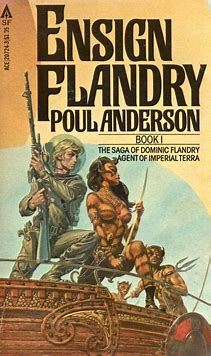Ensign Flandry.
Poul Anderson can tell us how human beings appear to a Merseian. Introduced to the Terran delegation, Brechdan correctly judges first that Hauksberg and Abrams warrant attention and secondly that Abrams' aide, Flandry, is alert but young and junior. A more experienced Flandry will have learned how to conceal his alertness. Brechdan is in no way at fault for failing to realize that, of these three, Flandry is is the one that needs to be watched the most. No one else realizes this yet either - except the readers. We know that we are reading the opening instalment of a Dominic Flandry series and therefore that Flandry is not about to fall at the first hurdle. Is Brechdan too anthropomorphic when conversing with Hauksberg and Abrams? At one stage, he shrugs. At another, he exchanges a grin with Abrams, then stiffens and answers curtly. Familiar human body language in an alien body.
This is surprising. Brechdan prefers not to visit Starkad because it is:
"Easier to make use of a world which was a set of reports than one whose people had been seen in their own lives." (p. 95)
Really? He will feel some measure of guilt or regret about his cynical manipulation of the Starkadians if he sees them? This from the guy who knows and likes human beings but feels no compunction about exterminating them if that becomes "necessary"?
How will morality work between different rational species? My understanding is that we have been naturally selected to help other human beings either because they bear the same genes or because they might help us in return and that we experience this motivation as moral obligation, not as calculating self-interest. We also feel bad about harming non-rational species. It seems to me that this sense of obligation should naturally extend to any other rational species although I have heard it argued that it should not, i.e., that we should be prepared to exterminate other rational species in order to colonize their planets! (One of Asimov's successors argued that his robots, programmed to protect human beings, would exterminate any other intelligent species, thus explaining the humans-only Galaxy of the Galactic Empire.) Suppose the Merseians do have a similar morality to ours except that, in their case, it really does extend only to members of their own species so that they really do see nothing wrong with exterminating other species?
There are indications in the Technic History that some Merseians do have a more universal morality.

1 comment:
Kaor, Paul!
I don't think it's that improbable for some Merseian body language to be similar to that of humans. After a thousand years of interacting with humans, it's not impossible the Merseians could have picked up some human gestures/mannerisms. Or, secondly, some humanoid races may have similar gestures because their physical structures makes them likely.
Yes, the wily Flabdry learned how to mask his very real, lethal abilities! In "Tiger by the Tail" and "A Message in Secret," he put on a convincing show of being a roistering ne'er do well or an ineffectual dolt. All the better to deceive his enemies!
Ad astra! Sean
Post a Comment